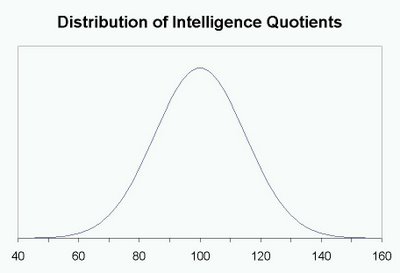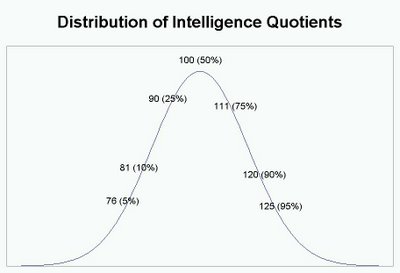THE BELL CURVE
In order to fully understand my theories on education, one must understand the concept of an intelligence quotient (or "I.Q.") According to the internet encyclopedia www.wikipedia.org, I.Q. is a quantifiable measure of one's cognitive abilities, or one's ability to process information. By design, it is normalized. If you were to measure the I.Q. of every person and distribute the scores, the distribution would, by definition, resemble a bell curve. Depending upon which I.Q. test is used, the shape of the curve may vary slightly between tests since the standard deviation may range from 15 to 24. (It's usually 15.) For all tests, the average (or mean) score is 100.
If the entire world were given a standard I.Q. test (with a standard deviation of 15 and an mean of 100), about 53% of the population would score between 90 and 110. Since this is a bell curve, there would be just as many folks with scores of 111 or greater as there would be persons with scores of 89 or less. (In both cases, approximately 23% of the population.) Likewise, there would be just as many people with I.Q.'s of 79 or less as there would be persons with I.Q.'s of 121 or more. (In both instances, approximately 8% of the population.) This is illustrated below.

As scores deviate further from the average (or the mean), the percentage of the affected population drops. As the chart depicts, there are more average people than either mentally-challenged people or geniuses.
Now, let's examine this chart by breaking it into percentiles:

As the above chart indicates, persons having I.Q.'s of 125 have cognition that is greater than or equal to 95% of the population. Likewise, persons having I.Q.'s of 90 have cognition that is greater than or equal to only 25% of the population. Finally, persons having I.Q.'s of 76 have cognition that is greater than or equal to only 5% of the population.
STANDARDS OF LEARNING
How does one measure the performance of a public school?
The generally accepted answer is measure the school's performance by comparing its test scores to those from other schools. In theory, if students at a particular school are failing their tests left, right and center, then such a school should lose its accreditation and close.
The problem with this theory is that the teachers who have a vested pecuniary interest in the accreditation of the school are themselves the ones grading the tests. It's the classic case of the fox guarding the hen house. If Bobby makes an "F" on his math quiz, what would stop his teacher from giving him an "A"? The more "A's" she hands out, the better chance she has of keeping her job. Besides, the less "F's" she distributes, the less she has to deal with irate parents. And if Bobby is a good football player, this makes the coach happy, too.
State departments of education have long recognized this inherent conflict of interest. This is why they have established "Standards of Learning" or "SOL's" which, in turn, are measured by standardized tests that are graded by the state departments and not the schools.
In Virginia, for example, students are tested each year as to whether they have mastered the SOL's. Students who do not pass their SOL tests will not advance to the next grade, and schools with unacceptable numbers of failures will eventually closed. (Not to single out the Old Dominion, just about every other state uses some type of standard.)
In theory, SOL's are good because they provide accountability and raise school standards. But do they really?
TYING IT ALL TOGETHER
Pretend for a moment that Governor X. Y. Z. from the great State of (I don't know... let's make up a name) "Missabama" advances a campaign for higher standards in education. He wants to get tough on under performing schools. So he signs an executive order--or otherwise convinces his legislature to enact a law--that will gear the SOL's to the cognitive abilities of the average child.
Assuming that the cognitive abilities of the all public school children in Missabama is a representative of the rest of the world (that is, the I.Q.'s of Missabama school children can be distributed on a bell curve), what percentage of Missabama students would likely fail their SOL tests?
Naturally, if the SOL's are geared to those students with average I.Q.'s, then those with below-average I.Q.'s would be in trouble. Further, since approximately 50% of all people have cognition that is below average, it follows that close to 50% of Missabama children would have below average I.Q's. Thus, one would expect that about half of Missabama school children would fail or otherwise struggle with their SOL tests.
Now imagine what would happen to the Governor's political fortunes if 50% of public school children failed their SOL's and therefore failed to advance to the next grade? Would the Governor have any hope of being reelected?
OK, let's say the Governor has an epiphany and realizes that he can't gear the SOL's to the average child. So he decides to gear them to the child with a 90 I.Q. --until he realizes that one-in-four school children would likely fail their SOL tests at the end of the year.
So he drops it again, gearing the SOL's to children with I.Q's of 81. Now only 10% are likely to fail. But does he want one-in-ten school children to fail to advance to the next grade while he is in office?
Finally, he drops the standards one more time... this time gearing them to children with I.Q.'s of 76. Now only 5% will have problems. Great! He can live with that.
CONCLUSION
The above hypothetical involving the Governor of the fictitious state of Missabama demonstrates that no one in government is competent to set standards for education.
If academic standards are raised, generally speaking, more students will fail. Conversely, if academic standards are lowered, more students will pass. It's almost axiomatic, really.
Well, if more students fail, more parents will be upset. If more parents are upset, they will demand different leadership at the state and local levels. Governors, legislators, superintendents of education--they all will feel the wrath of angry parents who feel that their children have been mistreated.
Like the teacher who has a vested pecuniary interest in giving Bobby an "A" when he should receive an "F," these politicians have a vested political interest in giving Bobby an "A" as well. After all, as test scores go up... so do the photo ops with smiling children.
Next time I will address solutions.


No comments:
Post a Comment